LabAdviser/Technology Research/Fabrication of Hyperbolic Metamaterials using Atomic Layer Deposition/AZO gratings: Difference between revisions
Appearance
| Line 9: | Line 9: | ||
== Process flow == | == Process flow == | ||
Description of steps for fabrication of | Description of steps for fabrication of AZO nanogratings. | ||
{| border="1" cellspacing="1" cellpadding="3" style="text-align: left; width: 925px; height: 220px;" | {| border="1" cellspacing="1" cellpadding="3" style="text-align: left; width: 925px; height: 220px;" | ||
| Line 121: | Line 121: | ||
!1.10 | !1.10 | ||
|Selective etch of Si between ALD AZO coatings. | |Selective etch of Si between ALD AZO coatings. | ||
|Si etching proceeds using | |Si etching proceeds using reactive ion etching with isotropic process based on SF<sub>6</sub> process gas. | ||
||Equipment used: [[Specific_Process_Knowledge/Etch/RIE_(Reactive_Ion_Etch)|RIE2]]. | ||Equipment used: [[Specific_Process_Knowledge/Etch/RIE_(Reactive_Ion_Etch)|RIE2]]. | ||
|[[image:06_ALD_eves.jpg|250x350px|center]] | |[[image:06_ALD_eves.jpg|250x350px|center]] | ||
Revision as of 16:56, 15 March 2017
Procces flow description
All samples were prepared and characterized in a class 100 cleanroom. Si (100) wafers of 150 mm were used as a substrate. The main steps in the gratings manufacturing are shown in a figure below. First, the silicon trenches were realized by deep reactive ion etching (DRIE). Then, the trenches were ALD coated. After the selective removal of the top parts, the silicon core between ALD coatings was etched away during the last step. The final structure represents the highly anisotropic vertical grating. Each fabrication step was carefully evaluated using cross-sectional scanning electron microscopy (SEM) imaging.
-
Scheme of fabrication flow. High aspect ratio AZO nanograting.
Process flow
Description of steps for fabrication of AZO nanogratings.
| Step | Description | LabAdviser link | Image showing the step | |
|---|---|---|---|---|
| 1.1 | Plasma surface treatment | To ensure clean surface, the 100 mm Si wafer is treated by O2/N2 plasma. (Optional step) | Plasma Asher 2 | 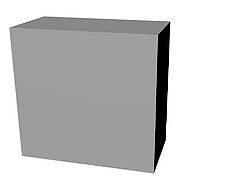 |
| 1.2 | DUV Resist patterning | DUV | DUV Stepper Lithography. | 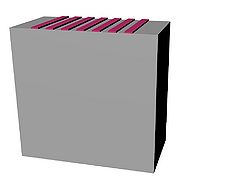 |
| 1.3 | Deep reactive ion etching (DRIE) | DRIE; Recipe: PolySOI10 Recipe needs to be tuned. Adjusted parameters: temperature, etching and passivation times. | DRIE Pegasus. | 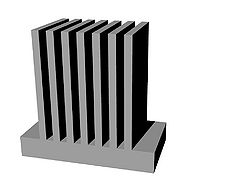 |
| 1.4 | Plasma surface treatment | To ensure that remainings of DUV resist are gone, samples are treated by O2/N2 plasma. (Optional step) | ||
| 1.5 | Scanning Electron Microscopy inspection | By cleaving the sample it is possible to inspect DRIE etched Si trenches in cross-sectional mode | 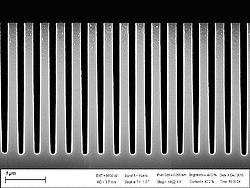 | |
| 1.6 | Atomic Layer Deposition of Al-doped ZnO (AZO) | Deposition carried at 200oC. Thickness is above 100 nm. | Equipment used: ALD Picosun R200. Standard recipe used: AZO 20T. | 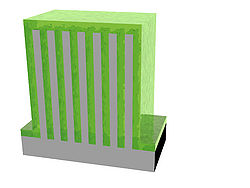 |
| 1.7 | Scanning Electron Microscopy inspection | By cleaving the sample it is possible to inspect ALD coatings deposited on Si trenches in cross-sectional mode | 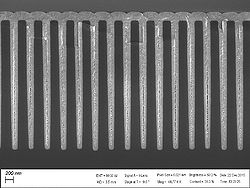 | |
| 1.8 | Ion Beam Etching (IBE). | Opening of deposited AZO top layer using recipe "Ti acceptance" there the stage was placed to 0o degree. The back side of the wafer also needs to be exposed to etching. | IBE/IBSD Ionfab 300 | 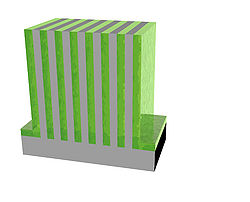 |
| 1.9 | Scanning Electron Microscopy inspection | By cleaving the sample it is possible to inspect IBE etching results in cross-sectional mode | 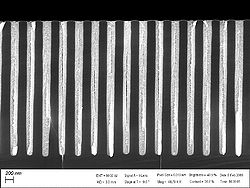 | |
| 1.10 | Selective etch of Si between ALD AZO coatings. | Si etching proceeds using reactive ion etching with isotropic process based on SF6 process gas. | Equipment used: RIE2. | 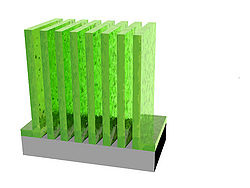 |
| 1.11 | Scanning Electron Microscopy inspection of fabricated structure. | Proof of final result. | 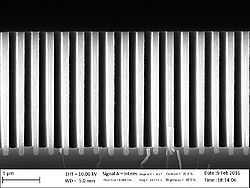 | |

